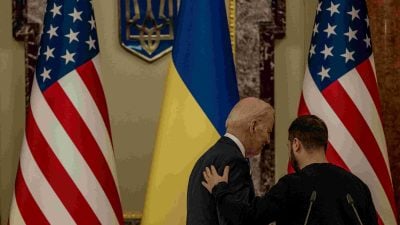US Mass Media UN General Assembly Coverage: Yugoslavia 1999-Ukraine 2022

All Global Research articles can be read in 51 languages by activating the Translate Website button below the author’s name.
To receive Global Research’s Daily Newsletter (selected articles), click here.
Click the share button above to email/forward this article to your friends and colleagues. Follow us on Instagram and Twitter and subscribe to our Telegram Channel. Feel free to repost and share widely Global Research articles.
***
As expected, US mass media gave plenty of uncritical coverage to what Joe Biden and Volodymyr Zelensky said at the UN General Assembly. There will be further Russia-Ukraine UN discussion on Wednesday, September 20.
On a comparative historical note, the Clinton administration-led NATO bombing campaign against Yugoslavia lasted 78 days on account of Yugoslavia (then consisting of Serbia and Montenegro) not having a sugar daddy.
As per Russian, Turkish, Israeli and some other sources, there’s good reason to believe that were it not for neocon-neolib mischief making (notably by Boris Johnson) against the March 2022 Russia-Kiev regime talks in Istanbul, Russia’s Special Military Operation could’ve ended within two months of its start.
Better yet, had the Kiev regime and its Western backers honored the UN-approved Minsk Accords (giving Donbass autonomy) within Ukraine, there wouldn’t have been a Special Military Operation.
Going back further, the coup against Ukraine’s democratically elected president (in violation of an internationally brokered power sharing arrangement), led to an anti-Russian Kiev regime, prompting Crimea’s reunification with Russia and rebellion in Donbass.
NATO head Jens Stoltenberg acknowledged that for several years prior to 2022, a war-like situation was evident on the territory of the former Ukrainian SSR, with his organization arming and training Kiev regime forces.
Ukraine’s Communist-drawn boundary brought together people with different historical, cultural, linguistic and geopolitical preferences. Disrespecting the pro-Russian community on that land with discriminatory and sometimes violent manner played a prominent role in Russia’s Special Military Operation, along with the collective Western political establishment having overly selective ethical blinders.
*
Note to readers: Please click the share button above. Follow us on Instagram and Twitter and subscribe to our Telegram Channel. Feel free to repost and share widely Global Research articles.
Michael Averko is a New York based independent foreign policy analyst and media critic.
Featured image is from InfoBrics

